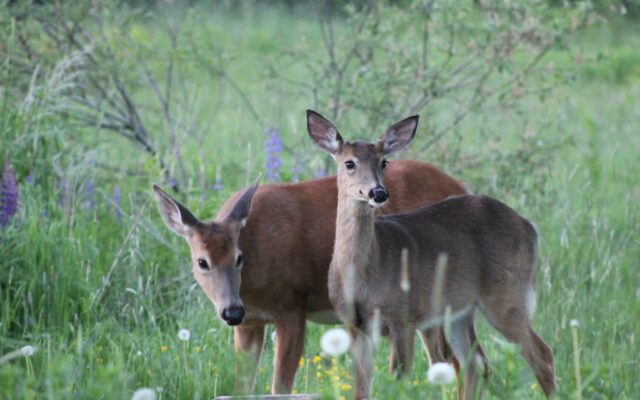
Here’s Maine’s plan for getting hunters to kill more does
By Pete Warner, Bangor Daily News Staff
If you’re lucky, you might soon have the chance to harvest at least two deer in Maine.
Hunters who are selected for an antlerless deer permit in a statewide lottery and pay a fee would have that opportunity under a Maine Department of Inland Fisheries and Wildlife proposal that was recently finalized.
The agency is restructuring its framework for managing female deer after 10 years of doe harvests that were significantly below objectives. That has led to overpopulation of deer in some areas of central and southern Maine. DIF&W believes the new lottery system would increase antlerless harvests by providing extra opportunities for hunters and provide them with more incentive to kill antlerless deer.
If approved, the proposed changes would allow hunters to harvest a buck and then take at least one antlerless deer if chosen in the antlerless deer lottery. Winners would have 30 days to pay a $12 fee for that permit.
The current system, which last year allotted nearly 154,000 any-deer permits to hunters, allows one antlered deer or an antlerless deer, but not both, for those who are selected.
“It’s important to note that all antlerless deer permits will allow for the take of an additional antlerless deer, so what you’re paying for is an authority to take an additional deer, which must be antlerless,” said DIF&W deer biologist Nathan Bieber.
Hunters would submit an application for the lottery that lists their two preferred WMDs, rather than three as is done in the current system. Winners could harvest an antlerless deer in the specified zone and also take a buck anywhere in the state.
Once all antlerless permits are assigned, any remaining permits available in specific WMDs would become available for $12 each on a first-come, first-served basis. DIF&W proposes that all be limited to one additional permit, regardless of success in the lottery.
That procedure would replace the bonus permit system now in place, which gave hunters access to so-called extra permits to take additional does. Hunters previously could get as many as three bonus antlerless tags.
Many hunters use the antlerless permits as a backup plan and only harvest a doe when they are unable to shoot a buck, DIF&W said. Numerous people do take a buck, thus are unable to cash in on their antlerless tag.
Bieber said monies collected from the permit fee would be deposited into the Deer Management Fund and would be used to acquire and manage deer wintering habitat in northern, western and eastern Maine. Any land acquired through that program administered by DIF&W also would be incorporated into the Wildlife Management Area system, making it open to public access and recreation.
Hunters who either are not selected in the antlerless lottery or do not purchase one of the surplus permits would be restricted to one antlered deer during the season.
The updated system also would do away with the transfer or swapping of antlerless permits, which has been allowed in the past.
“Elimination of transfers and swaps will decrease the likelihood of hunters obtaining permits with little intention or likelihood of using them and relieve significant administrative and law enforcement burdens associated with processing and keeping track of transferred and swapped permits,” Beiber said.
The proposal would give DIF&W Commissioner Judy Camuso the authority to determine some WMDs in which hunters would be allowed to take an antlerless deer on a regular hunting license, in a specific season, without a permit.
The department suggests initially allowing hunters to harvest an antlerless deer without a permit statewide on youth day, and for archery hunters during the regular archery season in WMDs 12, 13, 15-18, 20-26 and 29 for the 2022 hunting season.
Youth Deer Day is scheduled for Oct. 22 this year, while the regular archery and crossbow season runs Oct. 1-28.
A public hearing to discuss the changes is scheduled for Monday, May 2, at the Camden National Bank Ice Vault in Hallowell. The proposal is open to public comment through May 13.
Some of the proposed changes must be worked through the DIF&W rulemaking process and others require action by the Legislature.